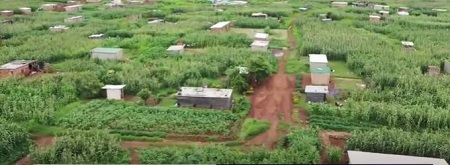The Crowborough Pattern

A case of infrastructure development in Greater Harare is indicative of a pattern of housing rights violations across Zimbabwe. Multiple spheres of government are responsible for thousands of actual and threatened forced evictions against households who have established themselves over years with the consent of local councils, only to be forced to surrender their homes and considerable investment to the bulldozers of a new generation of “land barons,” as they are locally known.
Located about 20km west of Harare’s Central Business District (CBD) is a former farmland that used to be owned by the Harare City Council. The land parcel had hosted the city’s sewage water-treatment plant, operated jointly with a cattle ranch known as Crowborough Farm. During the water-treatment operation, the bulk of the treated water was used for watering the ranch and thousands of head of cattle. However, the city’s sewage system eventually collapsed, and the plant and adjacent cattle ranch became obsolete and disused. It was later occupied by home seekers around the 2013 general elections.
Amid Zimbabwe’s current deficit of 1.3 million housing units and a housing waiting list of over 500,000 individuals, the City of Harare has not provided a single house for needy home seekers for two decades. Meanwhile, the demand for housing has spiked, enabling the emergence of unscrupulous “land barons” in a market of high demand. These are reported to be mostly politicians, linked to both the ruling and opposition parties and local council officials. Through dubious deals facilitated by local politicians, these public-private speculators grab peri-urban state and council land, including land allocated for other public purposes, for resale to desperate home seekers. Over time, such allocations have developed into well-developed housing cooperatives, as in Crowborough Farm.
In 2016, the Harare City Council sought and obtained 23 court rulings against housing cooperatives in the City of Harare, of which 16 are at Crowborough Farm. The City already demolished and forcibly evicted one such community of 190 families at nearby Budiriro. This was an act prohibited under Zimbabwe’s human rights treaty obligations, but carried out amid both the global pandemic and the rainy season in December 2020. Soon after, central government put demolitions of the other 22 cooperatives on hold, but only until April 2021 (the end of 20/21 rainy season).
Meanwhile, a total of about 40 other cooperatives across the country’s urban councils, housing thousands of men, women and children are scheduled to fall victim to this gross violation. Of these cases, none of the victims has been able to seek reparation for losses, costs and damages to which they are entitled under international law.
Each of these housing cooperatives is usually formed by a group of people who come together to buy a piece of land and build their own houses, usually comprised of between 100 and 1,000 people. In the near decade that the Crowborough residents have lived on their land, they have managed to build permanent homes by their own initiative. Some have built service roads, electricity, sewage and water connections, with some even paying rates to the City Council. Some are already in the process of legally formalising their settlement. This would secure inhabitants who have invested tens of thousands of US dollars’ worth of hard-earned income into these settlements.
Formalization of urban housing through provision of the required infrastructure, amenities and title are the corner stone of basic housing rights. From the recent experience of the demolitions in Budiriro (December 2020) in Harare, despite assurances from both local and central authorities, victims have not been able to obtain any form of humanitarian assistance of reparations to date.
The official reasons for the threatened evictions include charges that the houses are built on protected wetlands, sewer lines and sites designated for schools, clinics and other public-purpose designations, and multiple ownership claims. In these cases, the complexity of these disputes indicates how the various authorities have created these planning contradictions. At this juncture, the responsibility now lies with the central government to resolve.
Zimbabwe’s President Emmerson Dambudzo Mnangagwa has publicly pledged “To leave no stone unturned in bringing sanity to the country’s local authorities” that he said had failed Zimbabwe. On 25 February 2021, HIC-HLRN issued and delivered a letter of appeal to President Mnangagwa, encouraging him to act to ensure regularization of these organic human settlements and housing cooperatives at Crowborough Farm. HIC-HLRN has urged this alternative to forced eviction, in order to refrain from violating Zimbabwe’s solemn state obligations under treaty, especially in this year of Zimbabwe’s SDG-progress review before the High-level Political Forum in July 2021.
At the same time, Crowborough Farm case forms one in a pattern of collusion by central and local spheres of government and allied land barons profiting at the expense of households across Zimbabwe. Despite the harsh economic times in the country, while authorities shirk their public responsibilities, these victims have managed to compensate for dysfunctional local and central government and built themselves up to standard housing units and communities.
However, all they get in return from years of investments is a bulldozer and rubble. Local civil society and human rights defenders such as Zimbabwe People’s Land Rights Movement are calling for an end to the pattern of violations exemplified by Crowborough Farms and remedies that include a clear reparations plan or formalization where possible before demolitions, forced evictions, dispossessions and destruction of property and the lives of Zimbabwe’s struggling households.
|